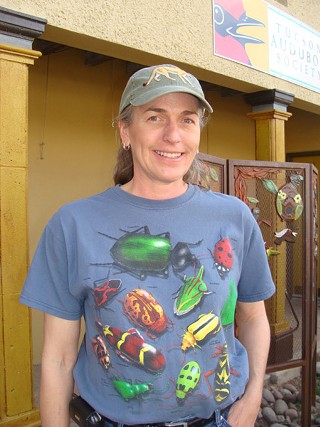Skye Siegel is a local Realtor with a different kind of background. She moved here 16 years ago to finish her master's thesis in ethnobotany, fell in love with the desert and decided to make Southern Arizona home. Before she went into real estate, she worked as a curator for the Arizona-Sonora Desert Museum, and now she's the project director for the Desert Dwellers' Centers with the Tucson Audubon Society. The group hopes to spur various projects, and is offering a series of classes beginning this month that cover matters that every desert-dweller should know about. For more information, call Siegel at 429-7777, or visit desertdwellerscenters.org.
What are the Desert Dwellers' Centers?
It's an education program that's done in conjunction with the Tucson Audubon Society and with funding from the Tucson Association of Realtors. The concept started officially in 2006, when I wrote this brochure on 40 facts that every desert-dweller should know. I got my boss at Tierra Antigua to front the money for (it). The idea is honoring where you live. When I became a real estate agent, I needed something, especially for newcomers. I didn't know a lot of this stuff, and I learned that there are a lot of people who live here who still don't know about living in the desert.
How did you start the organization?
I reached out to different groups. I had talked to the Audubon Society early on; I knew of their education programs. They were at the top of my list to approach first as a fiscal sponsor. I didn't want to reinvent the wheel. ... They told me they liked my ideas, and we got a $2,500 starter grant from the Realtors' association.
Is the idea to focus on educating the homeowner?
The homeowner or the renter. It could be ... someone who is retrofitting their home and land, and they are looking for resources, or (it could be) someone new, and they need to know that when they walk out into their backyard, they (may) see a lizard or coyote, or if it's monsoon, there could be mud coming into their backyard. It's really for everyone.
What have you discovered about people who have just moved here?
I think they are interested in new ideas and things, like water-harvesting, but there is so much information out there that they don't know where to start. We'd like to share resources and maybe show people who they can turn to, to do something low-cost. Some people also get intimidated in the desert, but we can show them simple things they can do around their home to improve its value or their comfort.
What are you doing with the $2,500 grant from the Realtors' association?
That money is going to help us reach out to more people and figure out how to dovetail what we are doing with the Audubon Society's ... home program. Right now, (our program is) completely volunteer-run, and the Audubon staff serves as advisers. That's the relationship now, but down the road, we know we will do more. We're working on grants and attracting local business support.
Is the current focus on your spring classes?
For the spring, we want to put together a program to introduce ourselves to the public, to introduce them to resources available and what kind of collaborations we want to do with other organizations. We want to go into neighborhoods where people want to work on specific projects and help (get) groups together (and) bring materials, money, supplies—any way we can engage the community.
By the fall, do you expect to have those specific projects identified?
We hope so. Our first step is just getting started, finding grants ... and identifying groups and neighborhoods who want more support on special projects.
Is there one desert issue that you see coming up a lot?
Scorpions. You don't have to bomb your house (to get rid of them). It's actually very simple. Most people forget about the spaces between venting and plumbing. Covering those physical barriers is the best way to keep scorpions out of the house. There are other things that are mysteries to people, from weather-stripping to how to interview someone who is going to work on your house. There's also an older population ... and they (may) not know a lot about living in the desert—about the heat, as well as understanding the critters and the plants. We think critters can be dangerous, but there are plenty of plants that are just as dangerous, but you don't know unless you are aware of it.





